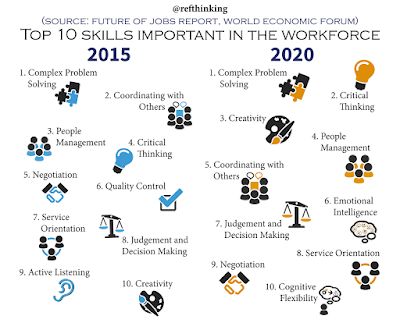Cognitive Flexibility: Paving the Way For Learner Success
Last Updated on 28 August 2023
A few years back the World Economic Forum came out with an article titled The 10 skills you need to thrive in the Fourth Industrial Revolution. The opening two paragraphs sum up the point of the piece nicely:
By 2020, the Fourth Industrial Revolution will have brought us advanced robotics and autonomous transport, artificial intelligence and machine learning, advanced materials, biotechnology, and genomics.
These developments will transform the way we live, and the way we work. Some jobs will disappear, others will grow and jobs that don’t even exist today will become commonplace. What is certain is that the future workforce will need to align its skillset to keep pace.
The image above shows the skills that will be most in demand in 2020 and probably well beyond. After reading this article I was extremely interested in how schools and educators provide opportunities for learners to not only acquire these skills but also illustrate competence in how they are applied. Some of the skills and how learners can demonstrate competency are self-explanatory. Others are not. This led me to focus on one skill in particular that crept onto the list at number 10 – cognitive flexibility. What does this skill entail? Below is a good definition from the University of Miami:
Cognitive flexibility is the ability to shift our thoughts and adapt our behavior to the changing environment. In other words, it’s one’s ability to disengage from a previous task and respond effectively to a new one. It’s a faculty that most of us take for granted, yet an essential skill to navigate life.
Spiro & Jehn (1990, P. 65) provide another look at the skill:
By cognitive flexibility, we mean the ability to spontaneously restructure one’s knowledge, in many ways, in adaptive response to radically changing situational demands.
Both definitions seamlessly align with Quad D learning based on the Rigor Relevance Framework as described below:
Students have the competence to think in complex ways and to apply their knowledge and skills they have acquired. Even when confronted with perplexing unknowns, students are able to use extensive knowledge and skill to create solutions and take action that further develops their skills and knowledge.
In my mind, cognitive flexibility might be the most important skill on the list as it incorporates so many of the others in some form or another. Below are a few ideas and strategies on how to help learners develop this important skill:
- Design learning activities the support divergent thinking where learners demonstrate understanding in creative and non-conventional ways.
- Empower students to identify a solution and then come up with a workable solution in a makerspace.
- Allow students to explore a topic of interest in OpenCourseware and then demonstrate what they have learned in non-traditional ways (see IOCS).
- Implement personalized learning opportunities where students think critically, openly explore, and then do using their own intuitive ideas to learn in powerful ways.
- Engage students in a real-world application in unanticipated situations where they use their knowledge to tackle problems that have more than one solution.
- Provide pathways for students to transfer learning to a new context.
How we prepare our learners for the new world of work has to be a uniform focus for all schools. The key to future-proofing education and learning is to get kids to think by engaging them in tasks that develop cognitive flexibility.
Source: A Principal's Reflections
I am a Senior Fellow and Thought Leader on Digital Leadership with the International Center for Leadership in Education (ICLE).

